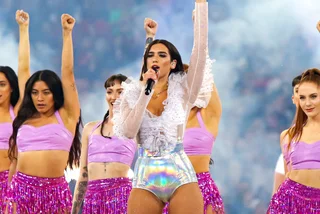In some countries, interest in the annual Eurovision Song Contest rivals the largest sporting events. In the Cold War Era, though, most members of the Eastern bloc were shut out. Czechoslovakia and later Poland decided to hold their own rival versions called the Intervision Song Contest. The results, though, are a barely remembered musical footnote.
While Intervision has not hit the airwaves since 1980, save for a one-off entry in 2008, people can watch this year's edition of Eurovision on Saturday, May 22, at 9 p.m. on ČT2, or with English commentary live over YouTube on the Eurovision channel. The Czech Republic, which had been represented by Benny Cristo, failed to qualify for the finals.
Unlike Eurovision, the Intervision contests did not move to a new country from year to year. The Intervision Golden Clef (Zlatý klíč Intervize) was hosted in then-Czechoslovakia, with the first edition on June 12, 1965, at Prague’s Karlín Music Theater as part of the second year of the Golden Prague International Television Festival. Singer Karel Gott won with “Tam, kam chodí vítr spát” (Where the Wind Goes to Sleep).
This contest and the subsequent editions were televised to participating countries and a few others, similar to Eurovision, which had been running since 1956.
The next two years the Intervision contest was held in Bratislava as part of the larger Bratislavská lyra music festival, sometimes called the Bratislava International Pop Song Festival in the Western press. In 1966 there were seven socialist countries plus Finland. Each country sent two songs. The winner was Bulgaria, with the song “Adagio” sung by Lili Ivanova. Karel Gott came in second, with the Slovak-language entry “Mám rozprávkový dom” (I Have a Fairy Tale House), which also won the Golden Lyre award in the separate national competition at the the same festival.
In 1967, each country sent only one song. Singer Eva Pilarová, who won in the Czechoslovak qualifying rounds, earned a Golden Clef with the song “Rekviem” (Requiem).
The final competitive edition was in Karlovy Vary in 1968, when under the reforms of Prague Spring it was opened up to not only musical acts from Intervision broadcasting network countries but also to Eurovision network members.
As in previous years, the contest was broadcast in the participating countries and a few other places, but its reach and viewership was still much smaller than that of Eurovision.
(Technically Eurovision is the name of the network run by the European Broadcasting Union as a platform to share programming, though most people now use the name to refer to the network’s song contest, and not the network. Finland and Yugoslavia were members of both the Eurovision and Intervision networks and appeared in both contests.)
The Intervision contest in general flew under the Western press radar, but the 1968 edition did manage to at least garner a few mentions in Western trade industry magazines.
The June 22, 1968, edition of Billboard magazine gave it a few sentences as a teaser before it happened. “Fourteen nations will compete in the Golden Clef Pop Song Contest in Karlovy Vary, Czechoslovakia, on Saturday (22). … This third Golden Clef contest will be the first one open to both East and West European countries,” the magazine said.
Aside from the list of songs and singers and a note that both Intervision and Eurovision members were eligible, that was the entire article. And even in that short space they make an error, as it was the fourth edition.
Czechoslovakia was represented by, unsurprisingly, Karel Gott singing “Proč ptáci zpívají?” (Why Do Birds Sing?). The official video for the song, released by record label Supraphon, features Gott's performance in Kalovy vary and him signing autographs for fans.
The other Eastern bloc entries were the USSR, Yugoslavia, Hungary, Bulgaria, Poland, Romania, and East Germany. Contestants from the West came from Austria, Belgium, Finland, Spain, Switzerland, and two from West Germany.
Gott won again, taking home his second Golden Clef. The Silver Clef went to Yugoslav singer Vice Vukov for “Ako Sada Odeš” and the Bronze Clef to Spanish singer Salome for “Pase lo que pase.” Vukov, incidentally, represented Yugoslavia in Eurovision in 1963 and 1965.
Three Western acts earned honorable mentions: Belgian pop star Paul Louka with “Lily,” West Germany's ARD -TV entry “Zigeunerjunge” sung by the single-named Alexandra, and Switzerland's “Für alle Zeiten” sung by Paola del Medico.
Austrian singer Jack Grunsky, who entered with “The South End of Town,” didn’t win, but he would soon move to Canada where he became a two-time Juno award-winner for his children’s albums.
A half-hour report on the 1968 edition (in Czech, but filled with musical interludes) can be seen on the archives of Czech Television.
Billboard reported the contest results, but was a bit less than enthusiastic. They did at least say it was “the East European equivalent of the Eurovision Song Contest.” They also made an effort to distinguish the name of top prize, the Golden Clef, from the name of the competition, the Intervision Song Contest.
“The 15 songs in the contest – West Germany had two entries, from ZDF -TV and ARD -TV – were not up to the standards of Eurovision songs and there was no song of immediately apparent hit potential, like ‘Congratulations’ or ‘La, La, La,’” Billboard’s Lubomír Dorůžka reported, referring to recent Eurovision hits.
Dorůžka lamented that the contest failed to attract much interest from music publishers or record company representatives, who mostly went to the Bratislava Pop Festival held a week earlier. That festival had a much more impressive international lineup: UK band the Shadows featuring Cliff Richard, Australian band the Easybeats, and UK singer Julie Driscoll performing with Brian Auger and the Trinity.
“It is likely that next year the Golden Clef will again be incorporated in the Bratislava event. The organizers are also planning negotiations to invite participation from a number of independent American TV companies next year,” Dorůžka wrote.
But due the Soviet-led invasion in August 1968 and the subsequent suppression of the Prague Spring freedoms, neither a 1969 nor 1970 edition was held. “Socialism with a human face” had come to an abrupt end, replaced by a strict policy called Normalization.
Dorůžka also pointed out that Czechoslovakia won three out of the four times the contest was held, and came in second the other time. Gott alone won three prizes: two gold and a silver. This may have discouraged a lot of international interest. Whether Czech singers scoring so well in all of the contests was due to bias by the judges or simply because Gott and company were better than everyone else is a matter of speculation.
Despite the East-meets-West efforts, Eurovision held its own members-only contest in April 1968 in London. Karel Gott would sing in that contest as well, but representing Austria with the song "Tausend Fenster." He did not win. Spain’s Massiel (María de los Ángeles Felisa Santamaría Espinosa) won with “La, La, La.”
There was an attempt to revive the Golden Clef in 1971. It was held as part of the Děčín Anker Festival, but had only six Eastern-bloc entrants plus a special guest. It was described as a non-competitive gala, so it seems no prizes were given out. Intervision contest veteran Eva Pilarová represented Czechoslovakia.
Billboard speculated at the time that it “may soon develop into an interesting international meeting with considerable potentialities.” It did not. It is not clear if this edition of the Golden Clef was officially linked to the Intervision network, or even if it was televised at all, as information on it is sketchy at best.
Czechoslovakia then gave up on the idea, but another incarnation of an all-Eastern bloc Intervision Song Contest emerged in Sopot, Poland, from 1977 to 1980. Czechoslovak singer Helena Vondráčková won the first edition with the song “Malovaný džbánku” (Painted Jug). The Soviet Union, Poland, and Finland won in subsequent years.
As was the case in Czechoslovakia, politics intervened. The contest was canceled after 1980 due to the growing influence of the Solidarity movement in Poland. By Dec. 13, 1981, Poland was under martial law, which lasted until July 22, 1983.
An attempt to revive Intervision was held in Sochi, Russia, in 2008. No more episodes followed. Another edition was announced for 2014, but it was quickly postponed without explanation and never took place.
The Czech Republic first entered the Eurovision Song Contest in 2007, but dropped out in 2009 due to poor scores and a general lack of audience interest. The country re-entered in 2015, but has so far never won. The best showing was in 2018 with Mikolas Josef singing “Lie to Me.” He finished in sixth place.












 Reading time: 6 minutes
Reading time: 6 minutes 






























